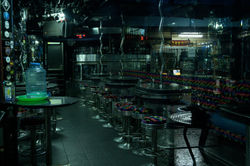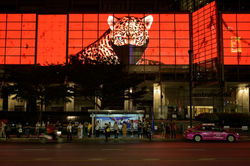top of page
Sirachai Shin
Arunrugstichai
p h o t o j o u r n a l i s t

A look inside Thailand, which prevented coronavirus from gaining a foothold
 Thailand reacted quickly to the coronavirus pandemic and managed to control the spread of the disease. Now the country is opening up again, with masked crowds filling Bangkok's Chatuchak Market, one of the largest in Southeast Asia. |  A masked police officer clutches a bag of takeout food as he rides past the Gate of Mani Nopparat, part of the Grand Palace complex in Bangkok. Usually the city has among the worst traffic in the world but the roads emptied when a curfew was put into place in early April and residents were encouraged to stay home. |  A man walks through the empty main hall of the Central Pinklao department store in Bangkok, which was closed during the coronavirus shutdown. The food sections of some stores as well as supermarkets were allowed to stay open. |
|---|---|---|
 A maintenance worker walks along a ramp at Bangkok's Suvarnabhumi Airport, one of the largest airports in Southeast Asia. With international and domestic flights restricted, this once hectic regional hub is now largely empty. |  Even before flights were banned in early April, people had stopped traveling, leaving rows of empty seats on this flight to Bangkok. |  Even during a pandemic, religious practices continue. A woman feeds Buddhist monks, who are not allowed to buy food. The monks made the face shields themselves, following a design on an internet video. |
 Thai traditional dancers at the Erawan Shrine in downtown Bangkok perform a ceremonial dance at the request of a worshipper praying to Phra Phrom, as the Hindu god Brahma is known in Thailand. |  A healthcare worker with a mobile COVID-testing unit collects a sample from a person who is at risk of coronavirus infection. The team operates out of a modified ambulance, which brings tests to potentially infected people so they don't have to travel and expose others. |  To prevent the spread of coronavirus, the Thai government shut down places like Tilak Bar, a famous go-go bar for foreign tourists in Soi Cowboy, a red light district. |
 When restrictions eased, people began eating out again. A restaurant in Bangkok's Chinatown placed protective plastic barriers on outdoor tables in an effort to separate diners from each other. |  Homeless people line up close together to receive food packages donated by other Thai citizens. Homelessness rose in Bangkok when the city shut down and people lost their jobs. |  Although the country has opened up, face masks are still strongly encouraged, and even advertised. A commercial promoting mask wearing is displayed on the side of a closed department store in Bangkok while people try to maintain social distancing at a bus stop. |
bottom of page